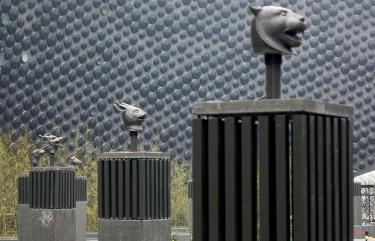The National Palace Museum is to remove replicas of artwork donated by Hong Kong actor Jackie Chan (成龍) amid controversy over Chinese attempts at “cultural unification,” museum Director Lin Jeng-yi (林正儀) said at the Legislative Yuan in Taipei yesterday.
At a question-and-answer session of the Education and Culture Committee, Lin said the National Palace Museum Southern Branch would remove a set of 12 bronze zodiac sculptures donated by Chan that are replicas of works looted from China’s Old Summer Palace by British and French forces in 1860.
The sculptures are displayed outside the museum’s Chiayi County branch and have been a target of criticism because they have been linked to China’s “united front” strategy, given that Chan is a member of the Chinese People’s Political Consultative Conference.
“Architects, collectors, those in art circles and the media believe it is necessary to remove [the sculptures],” Lin said.
The sculptures will be removed by the end of this month because they are not considered public art or collectibles in art circles, he said, adding that while academics have suggested that local artifacts should be put on display so the museum stays relevant.
Politicians said that the political nature of the sculptures has to be understood, Lin said.
A destination for the sculptures has not been decided on, he said, adding that they would be managed as general property instead of as an art collection.
The museum did not ask Chan’s opinion about the removal, but will inform him of its decision, Lin said.
The Jackie Chan Group said the donation was itself an artistic act to present the spirit of cultural preservation, while Chan made the donation because it is an institution that respects and preserves civilization.
Chan made the same donation to Singapore’s Asian Civilisations Museum with the same underlying philosophy, the group said.
The group respects the National Palace Museum’s different understanding of the donation, it added.
In related news, Lin said he does not think former National Palace Museum director Feng Ming-chu’s (馮明珠) acceptance of an advisory position with the Beijing Palace Museum is appropriate.
Feng’s employment has raised controversy because according to the Act Governing Relations Between the People of the Taiwan Area and the Mainland Area (臺灣地區與大陸地區人民關係條例), former high-level officials have to apply for approval to visit China within three years of leaving government service, but in May, Feng reduced the period to three months before she stepped down and accepted the employment earlier this month.
There are no national secrets involved in the management of the National Palace Museum, but it involves executive secrecy, Lin said in response to Chinese Nationalist Party (KMT) Legislator Ko Chih-en’s (柯志恩) question over whether Feng could expose government secrets.
“It is worried that [Feng’s employment with the Beijing museum] could cause leaks of information, because a National Palace Museum director has a broad range of authority and can access confidential artifact inventories,” Lin said.
Feng returned to Taiwan on Tuesday last week and the National Palace Museum has asked her to explain her employment, Lin said, adding that a response is expected by Sunday.
Source: Taipei Times - 2016/09/23





















